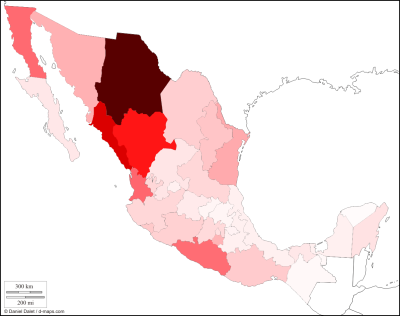Public Security News from Mexico
07/29/11
Latin America and the Caribbean
 |
|
Map of homicides per 100,000 people in Mexico, by state (Map made by Adam Isacson).
|
Chihuahua
-
Following numerous attacks of police officers, law enforcement officials in Ciudad Juárez have begun receiving training from police from San Diego, California. The Mexican officers will receive training from their American counterparts in evading and defending against attacks and ambushes by organized crime.
- More than 1,000 people were arrested in Ciudad Juárez in a massive crackdown on human trafficking. Authorities reported that they also rescued a number of underage girls.
- 17 people were killed when fighting broke out in a prison in Ciudad Juárez. State prosecutors are investigating allegations that prisoners smuggled in weapons and women into the prison and that jail guards attended a party held by the inmates prior to the riot. According to the Chihuahua state Attorney General's office, both the killers and the victims were inmates, not prison officials. In addition to shedding light on the corruption inside prisons in Mexico, the incident highlighted the tensions between local and federal authorities in Ciudad Juárez. Juárez Police Chief Julian Leyzaola said that at least 20 federal police officers fired on his vehicle when he and his bodyguards arrived at the scene of the prison riot. Federal police insist that Leyzaola breached the security perimeter they had established without identifying himself.
Coahuila
- A group of unidentified assailants, armed with automatic weapons and bulletproof vests and vehicles, attacked the Municipal Director of Public Security's convoy in Torreón. The authorities managed to repel the attack, killing two assailants and capturing three trucks.
Distrito Federal
- InSight Crime reports that the narcoviolence terrorizing the north of Mexico could soon spread to Mexico City. While local authorities maintain that there are no major cartel operations in the capital city, federal officials worry that the enormous, uncontrolled market and the ease of money laundering in Mexico City may tempt the cartels to move in and establish more organized networks.
Entire Country
-
According to a study by Mexico's National Institute of Statistics and Geography, homicides in Mexico rose 23% in 2010. Last year there were 22 homicides per every 100,000 people in Mexico. The states of Chihuahua and Sinaloa had the highest murder rates in the country, with 4,747 and 2,505 killings last year respectively.
- According to an Excelsior poll, around two-thirds of the Mexican public believe that the military's record with respect to human rights is satisfactory. Although the Mexican Supreme Court ruled last week that members of the military accused of human rights violations must be tried in the civilian courts, only 22% of poll respondents say that they consider civilian courts better than military courts.
Nuevo León
-
10 people were killed in two firefights between armed men and members of the Army.
- The municipality of Guadalupe announced that it has fired more than 570 police officers in the past two years and that it will substitute them with former members of the military. The mayor reported that while the town suffers from a deficit of around 250 police officers, 120 ex-soldiers are currently being trained to work in law enforcement.
Veracruz
-
A video appeared online announcing the formation of a new group called the "Matazetas." In the video, 30 masked men, presumed to be members of the New Generation Jalisco Cartel, appear brandishing automatic weapons while a voice is heard naming members of the Zetas who were allegedly involved in the recent assassination of two journalists in Veracruz. The unidentified speaker also praised the governor of Veracruz for fighting the Zetas.
- The body of Yolanda Ordaz de la Cruz, a police reporter for Veracruz's largest newspaper, Notiver, was found decapitated, two days after the journalist was abducted from her home. Only a month earlier another Notiver reporter, Miguel Angel López Velasco, was killed along with his wife and son. A note left on Ordaz's body allegedly connects the two murders. Veracruz state Attorney General Reynaldo Escobar denied that Ordaz was killed because of her work and alleged that the reporter had connections with organized crime. The editors of Notiver vigorously defended their slain colleague, calling the accusations "unjust, irresponsible and foolish" and demanding Escobar's resignation. Paris-based NGO Reporters without Borders has urged Mexican authorities to do more to protect journalists in Veracruz, where 77 reporters have been killed since 2000.
This blog was written by CIP Intern Claire O'Neill McCleskey
